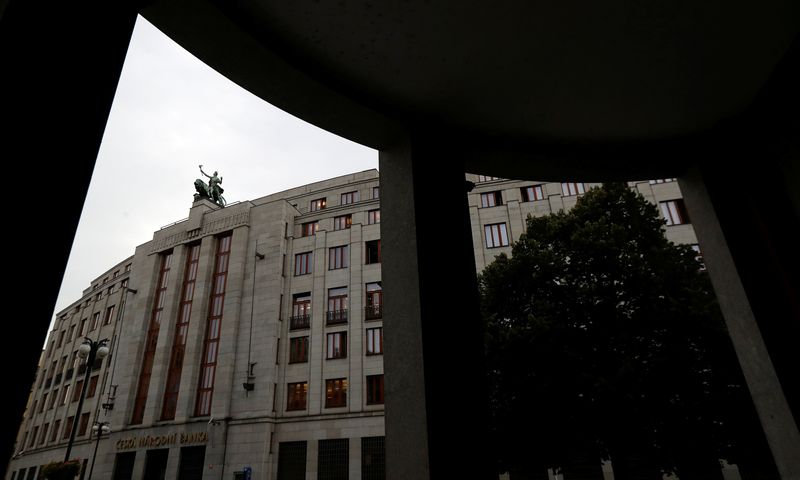Next Czech central bank chief proposes end to rate hikes By Reuters
[ad_1]
 © Reuters. The Czech National Bank is seen in central Prague, Czech Republic, August 3, 2017. REUTERS/David W Cerny
© Reuters. The Czech National Bank is seen in central Prague, Czech Republic, August 3, 2017. REUTERS/David W CernyBy Jan Lopatka and Jason Hovet
PRAGUE (Reuters) -The Czech National Bank’s (CNB) next governor, Ales Michl, called for an end to fast interest rate hikes to fight the strongest inflation pressures in almost three decades after his appointment to lead the bank on Wednesday.
In a ceremony at Prague Castle, President Milos Zeman appointed Michl, a bank board member who has opposed policy tightening that has brought the bank’s key rate up by 550 basis points since last June to a 23-year high of 5.75%.
Michl, 44, will replace outgoing Governor Jiri Rusnok for six years from July, and his arrival may sway the bank’s views on using rates against inflation – especially if Zeman appoints like-minded people to three other seats on the seven-strong board in the coming weeks.
The crown, after losing 2% last week on leaks that Michl would get the job, slipped more than 1% to hit a two-month low of 25.47 to the euro after he received the official nod.
Czech inflation is currently running above 14%, the highest level since 1993, and is starting to hit households who face soaring utility bills. Analysts expect a sharp slowdown in growth this year.
Michl said after his appointment that his main goal would be returning inflation to the bank’s 2% target, a process he expected to take two years.
But higher rates were no remedy given inflation was mainly driven by energy prices, he said, and the level of rates when he starts the job should be enough.
“I expect I will propose, at the first meeting I lead in the summer, stability of interest rates for some time,” he said.
“We will evaluate impacts of monetary policy to date, new indicators coming from the economy, and after a certain period decide what next.”
Markets have priced in one last beefy rate hike in June, although that will still lag the bank’s latest outlook showing interest rates soaring this quarter before ebbing after that.
“If the (new) bank board really explicitly excludes further rate growth, it may be seen on the crown, given current high inflation expectations,” said Jan Bures, chief economist at Patria Finance.
“The CNB can, like the NBP (Polish central bank) or NBH (Hungarian central bank) in the past, become a less credible partner for markets and can be pressed into some new action through a weaker exchange rate.”
Economists said Michl may also clash with the central bank’s expert team that has built rate hikes into its forecasts.
“If (Michl’s) conclusions diverge so substantially from the analytics of the central bank, it is not clear to me how does Michl himself see his job at the helm,” said economist Jaromir Baxa from the Faculty of Social Sciences of the Charles University.
VARIOUS PLANS
Zeman has not indicated whether he will replace Vice-Governor Tomas Nidetzky and board member Vojtech Benda – both hike supporters whose terms expire alongside Rusnok’s but who are eligible for reappointment. The president must also fill the seat Michl will vacate when he takes over as governor.
Michl had not always been dovish, voting in the minority for rate hikes after joining the board in 2018.
Before that, Michl worked as an economist at Raiffeisenbank and set up an investment fund. He advised former finance and prime minister, billionaire Andrej Babis, now leader of the opposition and a possible presidential candidate.
Michl has said inflation would drop if cost-side shocks end, budget deficits are cut, and companies show wage restraint.
He has spoken out against sales of any of the bank’s large foreign currency reserves, including its just-expanded programme of selling the returns on those reserve assets.
He has instead advocated for investing the bank’s reserves into higher-yielding assets to make profits, and supporting a sovereign investment fund he proposes to set up.
During the COVID pandemic, the bank rejected his proposal of sending a part of its profit – made mainly on unrealised exchange-rate gains – to the state budget, given the bank is obliged to first cover past losses and create reserve funds.
Source link